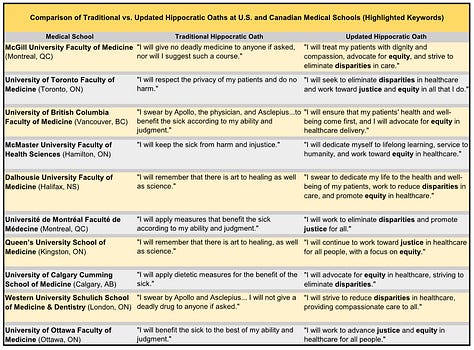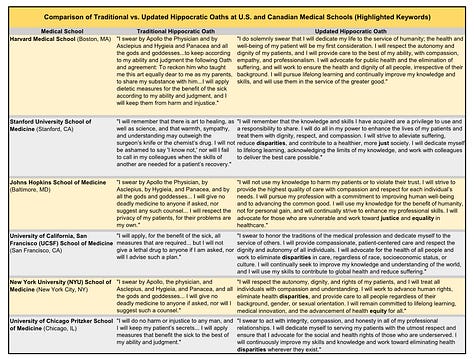The recent administration change in Washington has brought about welcome and long-needed scrutiny to the medical field, with a particular focus on the role social justice activism has played in how physicians are administering care. The Hippocratic Oath, a time-honored pledge that has guided physicians through centuries of healing practices, is undergoing a transformation that raises profound questions about the future of healthcare and medical education. Originally crafted to embody the principles of beneficence, compassion, and professional integrity, the Oath has evolved significantly, now intertwining with contemporary ideologies of social justice and equity. The integration of these concepts into medical training has shifted our focus away from the fundamental tenets of medicine—patient care and clinical excellence.
The original Hippocratic Oath, though not penned by the Greek physician Hippocrates himself, encapsulated ethical responsibilities that resonate with the essence of patient-centered care. The Oath’s call to avoid harm and respect the dignity of patients has been a guiding light for countless physicians. The Oath once included a covenant with the Greek deity Apollo, a prayer for physicians, and restricted the physician from terminating life. Over time, Western physicians evolved their religious and cultural beliefs and drew new boundaries between religion and the health professions. Mentions of a deity and prayer were removed to accommodate all religious believers and nonbelievers, and restrictions on abortion and euthanasia were removed. This evolution could be seen as a necessary step, allowing physicians to serve a diverse patient population without the constraints of religious dogma. Yet, as we navigate the complexities of modern healthcare, we must examine whether the redefined Oath truly serves its purpose, or if it simply obscures the core mission of medical practice.
Members of the health profession could easily argue that these changes were beneficial, as they fostered respect for the personal beliefs of individual physicians and their patients without affecting the original intentions of the Hippocratic Oath. However, more recently, political activist concepts like social justice and equity were introduced to university and medical school versions of the Hippocratic Oath and curriculums, raising serious concerns over their benefits.
A recent trend has emerged in medical schools across the United States and Canada, where the incorporation of terms like "equity," "diversity," and "social justice" have been incorporated into revised versions of the Hippocratic Oath. A 2022 survey by the Association of American Medical Colleges revealed that a staggering 96% of participating institutions are prioritizing diversity and inclusion as key learning outcomes. While the intentions behind these changes may in some cases be commendable—aimed at acknowledging the social determinants of health—the implications for medical education are deeply troubling. The following tables compare the traditional and updated oaths with keywords in bold to highlight the changes:



As a physician trained within the framework of the Hippocratic tradition, I find these developments misguided. The focus on demographic categories risks overshadowing the rigorous scientific education that is vital for effective medical practice. Rather than equipping future healthcare providers with the profound understanding of disease mechanisms, prevention, and treatment, we are diverting attention to a discourse that categorizes patients into overly simplistic boxes. This approach not only undermines the complexity of individual health needs, but also has the potential to dilute the mastery of clinical skills required for effective patient care.
The recent revelations exposed by Aaron Sibarium regarding Brown University School of Medicine are cause for further concern. Faculty promotion criteria now place a "Demonstrated commitment to diversity, equity, and inclusion" above clinical skills, raising alarms about the prioritization of social agendas over medical expertise. How can we expect to deliver high-quality care when the very foundation of our training is being altered to accommodate political ideologies? Perceived diversity should not come at the expense of clinical proficiency and a deep understanding of healthcare.
Advocates for diversity and inclusion initiatives often argue that traditional medical education neglects the impact of social determinants on health outcomes. Yet, this perspective fails to recognize that understanding these determinants should enhance, not replace, our focus on clinical knowledge. We can acknowledge the multifaceted nature of health without fracturing our commitment to rigorous medical training. The aim should be to provide personalized care that addresses individual needs, informed by evidence-based research rather than divisive categorization.
In light of these pressing concerns, I implore the Association of American Medical Colleges and individual medical schools to re-embrace the fundamental principles of the Hippocratic Oath. Our educational focus should return to mastering the basic sciences, physiology, and pathophysiology that underpin effective medical practice. Disease management should be grounded in robust evidence, scrutinized by the highest scientific standards. This approach can encompass the realities of social determinants of health without succumbing to the divisiveness that current DEI policies foster.
We can recognize diversity and treat everyone fairly without promoting division and ostracization. Personalized care can and should be provided based on demonstrated evidence of need. By prioritizing the fundamental tenets of the Hippocratic tradition, we can cultivate a healthcare system that respects individual differences without allowing them to overshadow the art and science of medicine. Let us not forget that the ultimate goal is to improve patient health outcomes—something that can only be achieved through unwavering dedication to the craft of medicine.
We welcome you to share your thoughts on this piece in the comments below. Click here to view our comment section moderation policy.
The opinions expressed here do not necessarily reflect those of the Foundation Against Intolerance & Racism or its employees.
In keeping with our mission to promote a common culture of fairness, understanding, and humanity, we are committed to including a diversity of voices and encouraging compassionate and good-faith discourse.
We are actively seeking other perspectives on this topic and others. If you’d like to join the conversation, please send drafts to submissions@fairforall.org.





Thank you! I completely agree. We have strayed from our roots. As physicians we cannot solve societal ills, we do not have the tools, we are ill equipped and frankly it distracts us from our core mission. It is so so depressing to me to see the young physician given an impossible task of prioritizing "inclusion and diversity" in our work. Our work is healing of the individual, not reconstruction of the social structure. We are so mislead about health care "inequity" to focus only on color of skin when the real inequity has a lot more to do with physicians not wanting to stray from their academic and urban and 'safe' like-thinking institutions to take care of the neglected in the rest of the country (or even world).
May your voice be heard in every ear in the medical field!